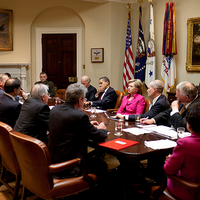Almost 30 years ago to the day, the United States broke off relations with Iran in response to the seizure of the U.S. embassy in Tehran. In doing so, the U.S. lost its most valuable source of information about the Islamic regime. To fill the void of knowledge resulting from 30 years of diplomatic estrangement, the Obama administration has turned to scholars and experts for insight into the Persian nation. Indeed, President Barack Obama's policy of outreach toward Tehran has been decisively shaped by the wide array of Iran experts, both within the administration and without, from whom he has taken advice.
As a candidate, Obama made his willingness to engage with Iran without preconditions a central part of his campaign. But whatever plans his administration initially had for engagement had to be revised, if not rethought, in the wake of the contested Iranian presidential election in June. As the biggest protests since the 1979 Revolution rocked the streets of Tehran, the White House spoke with Trita Parsi, the president of the National Iranian American Council (NIAC), on a daily basis to help navigate the uncertain terrain.
"We're supportive of the administration's position of engagement, and we are the only Iranian-American organization with a network of thousands," Parsi told World Politics Review. Parsi and NIAC were demonized by Bush administration officials as apologists for the Tehran regime. But the Obama White House has found the group's close ties to the broader Iranian population a valuable resource.

